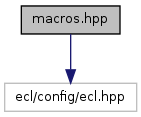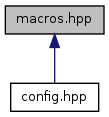Various macros useful for development. More...
#include <ecl/config/ecl.hpp>

Go to the source code of this file.
Defines | |
| #define | ECL_DEPRECATED |
| Deprecated compiler warnings. | |
| #define | ECL_DONT_INLINE |
| Prevents a function from being inlined. | |
| #define | ECL_HELPER_EXPORT |
| Declare public visibility for libraries. | |
| #define | ECL_HELPER_IMPORT |
| #define | ECL_HELPER_LOCAL |
| #define | ECL_LOCAL |
| #define | ECL_PUBLIC |
Detailed Description
Define Documentation
| #define ECL_HELPER_EXPORT |
Declare public visibility for libraries.
This emits (in a cross platform way) the required symbols for setting whether a function/class should be visible or hidden. Note only does this protect the private parts of your library, but it can also greatly speed up the linking process.
To check what symbols are being exported for a gnu library,
nm -C -D <library>.so
Usage:
Each package needs to create it's own macro to make use of the macro that cmake defines for library targets:
#ifdef ROS_BUILD_SHARED_LIBS // ros is being built around shared libraries #ifdef ecl_common_EXPORTS // we are building a shared lib/dll #define ecl_common_PUBLIC ROS_HELPER_EXPORT #else // we are using shared lib/dll #define ecl_common_PUBLIC ROS_HELPER_IMPORT #endif #else // ros is being built around static libraries #define ecl_common_DECL #endif
And use it alongside class or function definitions:
extern "C" ecl_common_PUBLIC void function(int a); class ecl_common_PUBLIC SomeClass { int c; ecl_common_LOCAL void privateMethod(); // Only for use within this DSO public: Person(int _c) : c(_c) { } static void foo(int a); };
- See also:
- ECL_HELPER_IMPORT, ECL_HELPER_LOCAL
Definition at line 144 of file macros.hpp.
| #define ECL_HELPER_IMPORT |
- See also:
- ECL_HELPER_EXPORT, ECL_HELPER_LOCAL
Definition at line 143 of file macros.hpp.
| #define ECL_HELPER_LOCAL |
- See also:
- ECL_HELPER_EXPORT, ECL_HELPER_IMPORT
Definition at line 145 of file macros.hpp.
| #define ECL_LOCAL |
Definition at line 151 of file macros.hpp.
| #define ECL_PUBLIC |
Definition at line 150 of file macros.hpp.